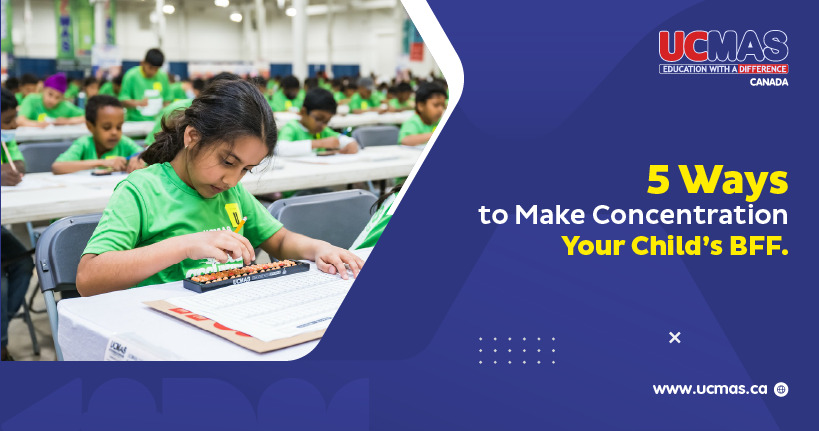
Concentrate! Focus! Is this what you keep telling your child? Saying these words out may be easy, but, what do they mean to your child? Is it easy for them to act on those words? These are a few questions to ask yourself before telling your child they need to concentrate in school or focus on the tasks given to them on a daily basis. In this blog, let’s understand what these words mean and we are also sharing important strategies to help your child concentrate better.
Concentration, Focus, and Attention Spans: Decoded!
First things first, let’s understand what these words mean. Imagine you’re watching a thriller movie. You may or may not like the genre. Now, focus is when you can direct your attention to just watching the movie, without scrolling Instagram or doing anything else. Concentration is when you stay focused on the movie and try to understand the plot. Your attention span will determine how long you’re able to concentrate on the movie and not get distracted.
Now that you’ve understood the meaning of these words and how they’re related, you might have an idea as to how important these cognitive skills are. In today’s competitive world, you simply cannot wait for your child to develop these abilities with age. It is imperative that you take charge and help your child work on their concentration and focus, to guarantee a bright future.
| Attention Span By Age Group | |
| Age Group | Attention Span |
| 4 years old | 8-12 minutes |
| 5-6 years old | 12-18 minutes |
| 7-8 years old | 16-24 minutes |
| 9-10 years old | 20-30 minutes |
| 11-12 years old | 25-35 minutes |
| 13-15 years old | 30-40 minutes |
This table offers a reference point, however, as each child is different, their attention span may differ. Observe the attention span of your child and collectively determine if you need to work on it.
5 Strategies to Catalyze Your Child’s Concentration Power.
Get the Basics Right
A nutritious diet, adequate water intake, and adequate rest play an important role in not only helping your child concentrate but also the overall well-being of your child. Ensure your child is well-fed with good, nourishing foods and most importantly at the right time. Avoid food and drinks with excessive sugar as they affect your child’s health.
Studies suggest that well-hydrated children can concentrate better and perform better on visual attention tasks. They feel less tired and bored during school hours or while studying. Similarly, a good night’s sleep plays an important role in helping your child concentrate. Establish a bedtime routine and make sure they get the required rest every night.
Exercise over screen-time
Physical exercise has a range of benefits among children. It increases blood flow to the brain, produces endorphins that reduce stress and anxiety, enhances memory and learning, and more. Therefore, exercise should be included in your child’s routine to help them concentrate better.
Don’t Just Wing It
Speaking of routines, make sure your child has one! From sleep routines to exercise routines, a pre-planned day is always more productive. While routines may sound boring, if planned well, they can go a long way in boosting your child’s concentration power and increasing their productivity. When your child knows what to expect from a day, it helps them focus better.
For example, having a set morning routine like waking up, having breakfast, and getting ready for school can help your child complete each task and promptly move on to the other. Similarly, if your child knows that they have a designated playtime after their homework, they will concentrate on finishing the homework in a timely manner and enjoy their playtime. Routines are known to create a stable environment and minimize distractions, thus promoting concentration.
Small is Easy
The thought of completing big tasks can be daunting to us as adults, let alone a child. Your child might get bored, and lose focus and concentration if the task is too big. Breaking these bigger tasks into smaller manageable ones helps. A small task will fit within their attention span and help them concentrate through the end.
Exercise that Brain
Just as exercise helps your muscles and body, it is also very effective for brain development. Brain exercises stimulate neural pathways and enhance your child’s cognitive abilities, which include concentration. Solving puzzles, memory games, mental math, and painting also help stimulate critical thinking and improve focus. By regularly engaging the brain, your child will develop the mental stamina to concentrate better and make tasks like homework or studying more manageable and enjoyable.
Is Mental Math the Answer to Your Child’s Concentration Problems?
Yes, it is! Mental math is like a superhero for concentration, swooping in to save the day with its incredible powers! While learning mental math, your child is exposed to the five important strategies that we discussed earlier. This brain-training endeavor enhances their focus and concentration, while they’re on their way to becoming math whizzes. Here are some of the many benefits of mental math.
Sharper Focus
When your child tackles mental math problems, they’re forced to concentrate solely on the task at hand. There’s no room for distractions because every calculation requires their full attention.
Muscle Memory
Mental math exercises strengthen your child’s muscle memory. Remembering numbers, operations, and steps in their head sharpens their memory and enhances overall concentration.
Problem-Solving Prowess
Mental math isn’t just about crunching numbers; it’s about solving puzzles. Each problem presents a challenge that requires careful thought and strategy, keeping your child’s mind engaged and focused.
Quick Thinking
In mental math, speed is of the essence. Your child must think on their feet, making split-second decisions and calculations. This rapid-fire thinking hones their ability to process information quickly and efficiently, improving concentration in the process.
Confidence Booster
As your child masters mental math, they’ll gain confidence in their abilities. This newfound self-assurance spills over into other areas, helping them stay focused and determined even when faced with challenging tasks.
Read more on how abacus math and mental math enhance your child’s concentration power and contribute to overall brain development.
Need more reasons to make mental math your trusty friend? Read our blog on how mental math contributes to your child’s brain development.
In a nutshell, mental math isn’t just about numbers – it’s about building a powerhouse of concentration skills that will serve your child well in school, in life, and beyond!
Think mental math, think UCMAS. With years of experience and research in the fields of mental math, abacus math, and learning techniques, UCMAS offers one of the best after-school math programs for kids. Enroll your child today to reap the benefits of a focused mind.





